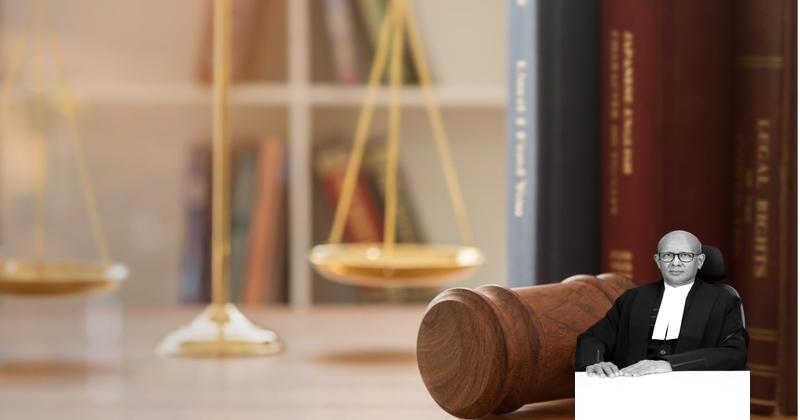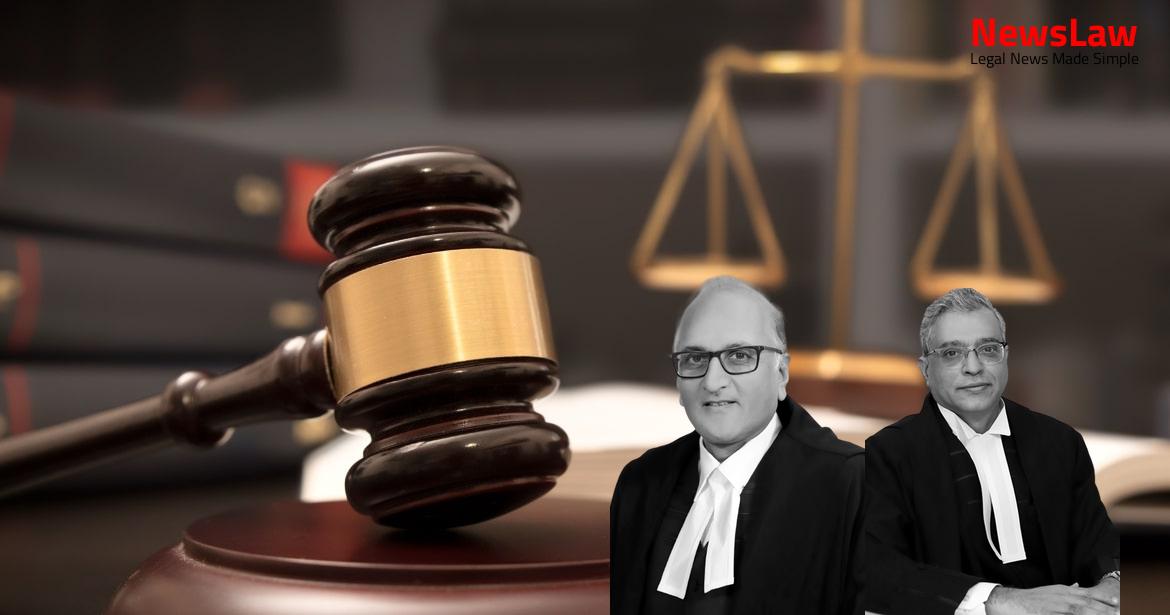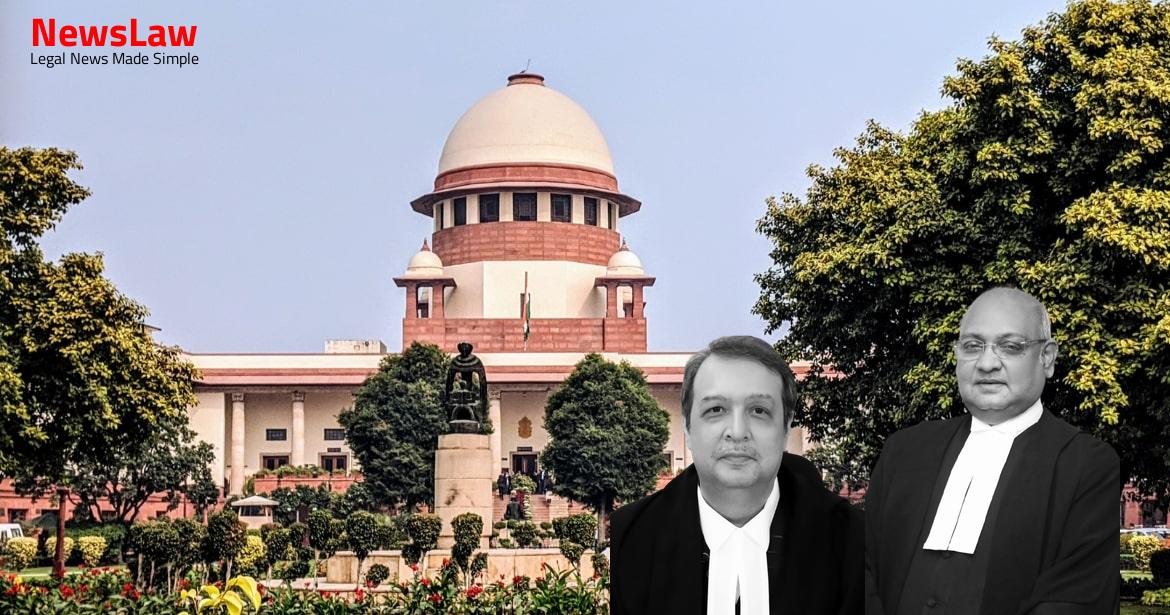The Supreme Court of India delivered a significant judgment in the case of State vs. Selvamani, emphasizing the need for fair trial conduct. The case revolved around the conviction of accused persons under various sections of the IPC and Tamil Nadu Prevention of Women Harassment Act. The court upheld the findings of the trial court and dismissed criminal appeals, setting a precedent for ensuring justice through proper trial procedures and conduct.
Facts
- Accused No 5 died during the trial, so the case against him abated.
- High Court upheld the findings of the trial court and dismissed criminal appeals.
- Accused persons were convicted under Section 376(2)(g), 506(1) IPC, and Section 4 of Tamil Nadu Prevention of Women Harassment Act.
- Each accused person sentenced to 10 years rigorous imprisonment and fine of Rs. 5,000 for Section 376(2)(g) IPC, 1-year imprisonment and fine of Rs. 1,000 for Section 506(1) IPC, and 1-year imprisonment for Section 4 of the Tamil Nadu Prevention of Women Harassment Act.
- In default of payment of fine, they were to undergo 3-months simple imprisonment.
- Final judgment and order dated 27 August 2019, passed by the High Court of Judicature at Madras, dismissed Criminal Appeal Nos. 449 and 840 of 2012.
- Sentence to run concurrently and the period already undergone to be set-off.
- Victim reported being gang-raped in a written information to Police Station Vaniyampadi Town
- Accused No. 1, the Manager/Owner of Emerald Shoe Company, along with 4 other accused, forcibly took the victim to a secluded place near Railway Bridge
- Victim was threatened and assaulted by the accused, leading to gang rape
- Medical examination and statement recorded under Section 164 CrPC supported the prosecution’s case
- Charges framed under Sections 376(2)(g) and 506(1) of IPC and Section 4 of Tamil Nadu Prevention of Women Harassment Act
- Accused pleaded not guilty and opted for trial
- Defense of the accused was based on false implication
- Accused filed criminal appeals against the trial court’s judgment
Arguments
- The appellant’s counsel argues that the High Court made a grave error in dismissing the appeal.
- Medical expert Dr. Indrani confirmed injuries on the victim’s person.
- The victim, her mother Jaya, and her aunt Jamuna did not support the prosecution case in their cross-examination.
- Appellant’s counsel highlights that the medical evidence does not align with the prosecution’s evidence.
- Evidence indicates forcible sexual intercourse multiple times by multiple persons, leading to loss of virginity and abrasions.
- Despite initial support for the prosecution case, the prosecutrix and her family changed their stance during cross-examination.
- The discrepancies in testimonies raise questions about the validity of the prosecution’s case.
- The prosecutrix, her mother Jaya (PW-2), and her aunt Jamuna (PW-3) fully supported the prosecution case.
- Counsel for the appellant referred to the case of Rai Sandeep alias Deepu v. State (NCT of Delhi) to argue that lack of support from the prosecutrix and medical evidence renders the conviction unsustainable.
Also Read: Dr. Kulwant Singh vs. Maternal Grandmother: Custody Dispute Supreme Court Judgment
Analysis
- The delay in cross-examination of witnesses in the particular case resulted in potential witness tampering and prevarication from their original testimony.
- The court emphasized the importance of conducting fair trials that adhere to the mandate of the law and strive to arrive at the truth.
- Instances of adjournments and delays in cross-examination were criticized for contributing to a lack of proper trial conduct.
- The court expressed concern over the laxity in granting time for cross-examination in serious cases, particularly those related to corruption offenses.
- The importance of completing cross-examination on the same day as examination-in-chief was highlighted to prevent potential witness tampering and manipulation.
- The duty of the court was emphasized as being not only to protect the interests of the accused but also to safeguard societal and collective interests.
- A call to all High Courts to circulate principles relating to trial conduct among trial judges to ensure trials are carried out in a requisite manner.
- Relying on previous judgments, the court stressed the need for proper trial procedures and avoiding delays in cross-examination to prevent the trial from becoming an ‘apology for trial.’
- The evidence of a prosecution witness cannot be rejected entirely just because the prosecution treated them as hostile and cross-examined them.
- The evidence of such witnesses should not be considered completely erased from the record but should be evaluated carefully to determine its reliability.
- Sections of the evidence that are deemed admissible can be used by both the prosecution and the defense.
- Minor discrepancies in witness statements are expected due to human limitations in absorbing all details of an incident.
- Previous cases have established that consistent portions of a hostile witness’s testimony can be relied upon, even if not in full support of the prosecution or defense.
- PW 7 in the case of Vinod Kumar was treated as hostile by the prosecution after a significant gap between examination-in-chief and cross-examination.
- The judgment in the case of Rai Sandeep alias Deepu is distinguished from the present case due to the nature of injuries on the prosecutrix.
- In Rai Sandeep alias Deepu case, there were only minor injuries on the neck, while in the present case there were injuries on the private part of the prosecutrix.
- The judgment in Rai Sandeep alias Deepu case is not applicable to the present case.
- No interference is warranted in the concurrent findings of fact by the trial court and the High Court based on the evidence.
Also Read: Analyzing the Legal Journey: Jasobanta Sahu vs. State of Orissa – A Landmark Case
Decision
- Pending application(s) shall stand disposed of.
- The appeal filed by the Petitioner No. 1 is dismissed.
Case Title: SELVAMANI Vs. THE STATE REP. BY THE INSPECTOR OF POLICE (2024 INSC 393)
Case Number: Crl.A. No.-000906-000906 – 2023



